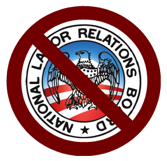
The Obama Administration and Senate Majority Leader Harry Reid pulled the wool over the eyes of naïve Senate Republicans in agreeing to pull back two objectionable appointees to the National Labor Relations Board (NLRB) in exchange for the dropping of any filibuster threat against replacement nominees.
Within 24 hours of the deal, President Obama submitted two new nominees who the White House admitted had been co-selected by AFL-CIO head Richard Trumka. They have already been reported out of committee and will face rubber stamp Senate votes next week.
But to pour salt in the wound, the White House might nominate failed nominee Richard Griffin for the post of General Counsel to the NLRB, reports the Huffington Post.
Griffin was the most objectionable of all nominees largely because he faces a civil RICO suit from some of the members of the union where he worked as its General Counsel. Now, Griffin is likely to find himself as the lead attorney for the NLRB, while hapless Senate Republicans wonder what hit them. Remember that it was Acting NLRB General Counsel Lafe Solomon who brought about the attack on the Boeing Corporation for having the audacity of opening an airplane manufacturing facility in the right to work state of South Carolina. So, as the saying goes inside the Beltway, being the General Counsel ain’t mashed potatoes.
The determination of Big Labor and the Obama Administration to put their hand-picked co-conspirators into place in the NLRB points out the extraordinary power the “independent” board enjoys.
Representative Austin Scott (R-Ga.) has introduced legislation that would strike to the heart of the NLRB’s power. Scott would simply strip away the NLRB’s adjudicatory authority. This simple action would take away the very capacity of this unaccountable, politically appointed Board to create employment law through their decisions.
Some may ask, why is taking away the NLRB’s power so important. The answer is found in the desperate maneuvers by the Senate majority at the behest of the Big Labor masters to pack the Board with pro-union members. Majority Leader Reid was willing to fundamentally change minority rights in the Senate in order to get nominees to this obscure Board in place.
Based upon the high stakes games played around the NLRB, it would be naïve to dismiss the Board’s power to impact the employment market as inconsequential. In fact, the NLRB over the course of the Obama Administration has proven to be the most effective government advocate for enacting Big Labor’s agenda.
For example, there was the Board’s ruling against Prime Healthcare Services, a California-based hospital company that was forced to continue collecting union dues even after the expiration of its collective bargaining agreement, a decision that overturned a half-century of legal precedent.
Then there was the agency’s ruling against Kent Hospital — in which the board held employees were no longer permitted to opt out of paying the percentage of union dues spent on political activity.
One could go on, but they underscore the most compelling reason to pass Representative Scott’s legislation. The only way to rein in big government is to strip it of its power, and there is no better place to start than with the NLRB.
The NLRB may be a little Board, but it has a big impact on the rules that govern how an employer and employee can interact in the workplace.
It is time for Congress to pass Representative Scott’s legislation to return the NLRB back to the obscure status that it was always intended for it.
Rick Manning (@rmanning957) is the vice president of public policy and communications for Americans for Limited Government.






